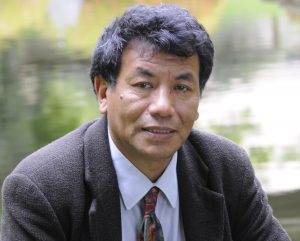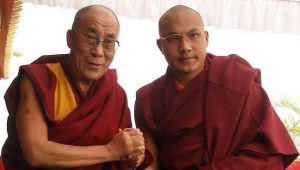Memo #55
Tsering Shakya – tsering.shakya [at] ubc.ca
 There is media frenzy in India following a police raid on the temple residence of Ugyen Thinley Dorje (ཨོ་རྒྱན་འཕྲིན་ལས་རྡོ་རྗེ།) where $1.6 million in different foreign currencies – some in Chinese yuan – was found. Ugyen Dorje is the 17th Karmapa (ཀརྨ་པ་) and is second only to the Dalai Lama in Tibetan Buddhism.
There is media frenzy in India following a police raid on the temple residence of Ugyen Thinley Dorje (ཨོ་རྒྱན་འཕྲིན་ལས་རྡོ་རྗེ།) where $1.6 million in different foreign currencies – some in Chinese yuan – was found. Ugyen Dorje is the 17th Karmapa (ཀརྨ་པ་) and is second only to the Dalai Lama in Tibetan Buddhism.
The Karmapa fled across the Himalayas in 2000 at the age of 14. Ever since his sudden arrival in India, the local media has speculated about his flight. The recent discovery of cash has reignited debate by political figures and media about the Karmapa’s real purpose in India. Former intelligence officer and top Indian bureaucrat, B. Raman, wrote that the Karmapa’s “escape to India was probably under a long-term Chinese intelligence operation to use him to influence events relating to Tibet after the death of the Dalai Lama.”
When Beijing installed him as a boy in 1992 in the Tsurphu Monastery, the traditional abode of the Karmapas, it was a major propaganda coup. China needed a high-ranking lama in Tibet to endorse their message of stability and unity. The Karmapa’s flight was a major setback for China. Today, no senior Tibetan lamas remain under Chinese control.
So why are some in India suspicious? Because the Karmapa has not publically denounced China since his defection and China also seems reluctant to demonize him as they do the Dalai Lama. Many fear that the Karmapa may be a Chinese agent. Moreover, they fear that Tibetans in northern India might be working as Chinese agents. They wonder if, after the death of the current Dalai Lama, they would abandon their political struggle and run into the open arms of China under the influence of this Karmapa.
New Dehli should allay these suspicions sparked by the discovery of cash, if only because donations will not stop coming. In fact, donations come not just from the West, but also from Tibet and in larger amounts. The Lama has thousands of followers who have benefited from the growth of China’s economy and thus have more disposable income to offer as remittances or religious donations. But with New Dehli and even Beijing unhappy with donations flowing from Tibet to Tibetans in India, and fears about Tibetans’ allegiance, it is the lamas who are caught in the middle.
About the Author:
Tsering Shakya is CRC Chair in Religion and Contemporary Society of Asia, Institute of Asian Research, The University of British Columbia
Links:
- Tibetan Lama Faces Scrutiny and Suspicion in India, New York Times, February 6, 2011
- Karmapa finds himself in controversy again, The Times of India, January 30, 2011
- The media is being stupid about Karmapa, The Sunday Guardian, February 6, 2011
- The Karmapa Controversy, Raman’s strategic analysis, January 31, 2011
Related Memos:
- See Tsering Shakya’s Memo, The Xinhai Revolution and Counter Revolution on the Frontiers of Republican China (Memo #103)
- Conditions in Tibet since 2008 (Memo #41 – Video interview with Dr. Robert J. Barnett)
- Dr. Andrew M. Fischer Discusses Development Issues in China and Tibet (Memo #17 – Video interview)
- The Prospects for Tibetan Self-Rule by Sophia Woodman (Memo #12)
